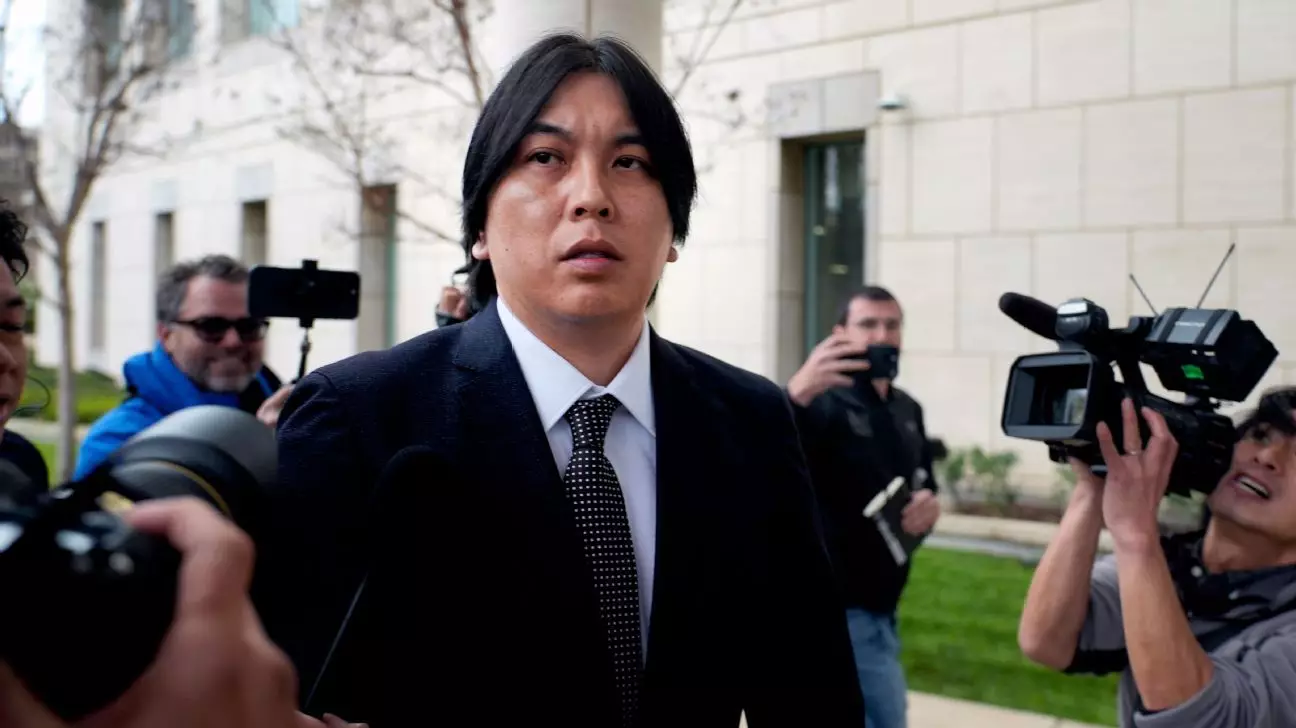In a tragic saga that intertwines fame, betrayal, and greed, Ippei Mizuhara, former interpreter for MLB superstar Shohei Ohtani, has been sentenced to nearly five years in prison for embezzling approximately $17 million from his boss. This shocking breach of trust has not only shocked the Los Angeles Dodgers community but also raised broader questions about oversight within sports organizations and the responsibilities of those in positions of trust. Mizuhara’s culpability underscores the frailty of human integrity when faced with insatiable greed.
During a sentencing hearing held in Santa Ana, U.S. District Judge John W. Holcomb expressed disbelief over the staggering amount Mizuhara siphoned off, emphasizing that the sum is incomprehensible for the average individual, who may rarely see such wealth throughout their entire working life. Holcomb’s remarks reveal a palpable frustration with Mizuhara’s actions, which he classified as a colossal betrayal of both the athlete’s trust and the moral standards expected in such roles.
Mizuhara’s downfall was rooted in a severe gambling addiction, a reality he acknowledged during court proceedings. However, his prior to the fraudulent activities raises significant questions about accountability and support for employees in high-pressure positions. Mizuhara reportedly placed over 19,000 bets, resulting in around $40 million in gambling debt. This alarming data speaks volumes about a struggling individual ensnared by addiction rather than merely a criminal drowning in greed.
Prosecutors, however, remained skeptical of Mizuhara’s claims regarding his gambling history, suggesting that there was minimal evidence of addiction before he began pilfering from Ohtani. This point raises critical discussions about the nature of addiction, particularly in professional sports, where the pressures to perform and succeed can lead individuals down alarming paths. The interplay of Mizuhara’s gambling issues with his role in Ohtani’s life illustrates a harrowing narrative of how trust can be easily manipulated.
After hearing the gravity of Mizuhara’s actions, Judge Holcomb handed down a 57-month prison sentence along with three years of supervised release. Additionally, Mizuhara has been ordered to make restitution payments totaling nearly $17 million to the beleaguered Ohtani and $1.1 million to the IRS. The consequences of his actions reflect broader societal sentiments about accountability, especially when vast amounts of money and trust are at stake.
While Mizuhara’s attorney argued for leniency, citing a longstanding gambling addiction, the court seemed unconvinced. The disparity between Mizuhara’s plea and the prosecution’s requests illuminates the growing concern around compensating victims in financial crimes and the expectations that come with fiduciary duties. The debate invites further examination of the legal system’s treatment of individuals engulfed in gambling addiction versus those committing premeditated fraud.
The aftershocks of this scandal extend beyond Mizuhara himself; they ripple through the entire Los Angeles Dodgers organization and the broader MLB community. Mizuhara held a role distinguished by proximity to not just Ohtani but also the high-stakes world of professional sports, leading to conversations about the stringent screening and support mechanisms necessary for anyone working closely with athletes.
As Mizuhara prepares to serve his sentence, questions linger regarding his eventual deportation to Japan and its implications on his family and community. Any consequences he faces resonate deeply, manifesting in both staff evaluations and the ethical frameworks surrounding employment within sports organizations. The saga serves as a cautionary tale about vulnerabilities that can exist, even among those deemed trustworthy.
The case of Ippei Mizuhara represents a poignant reminder of how fragile trust can be. As the dust settles on this scandal, a collective reckoning emerges around the responsibilities of those in positions of influence and the systems that should safeguard against their exploitation. It serves as an opportunity for introspection and reform, paving the way for a more vigilant and ethically sound sporting landscape.

